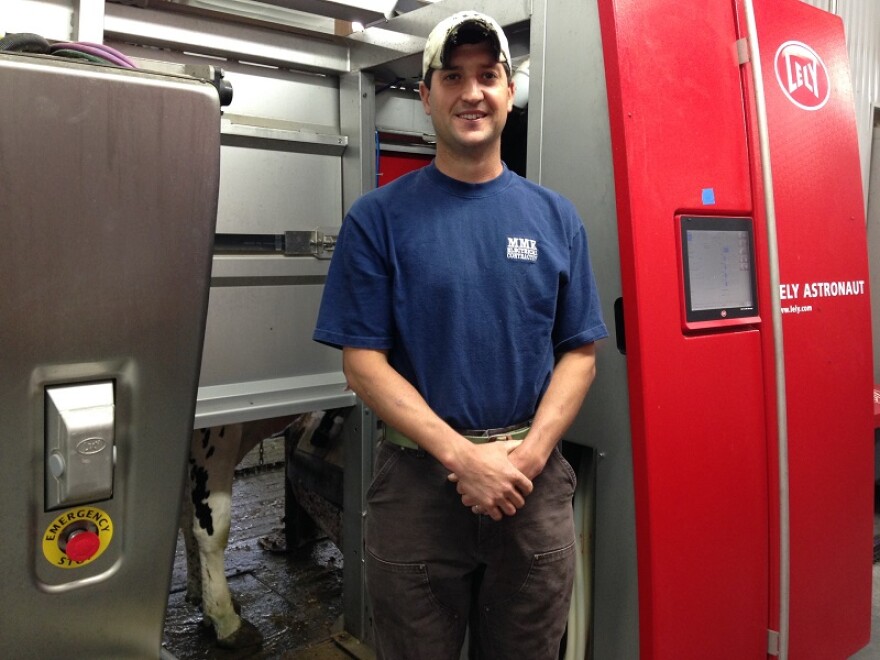Next time you pour a nice cold glass of milk, you could have a robot to thank. That's because automated milking machines are showing up at more and more dairy farms in Vermont and New Hampshire.
The technology is cutting down on labor costs, increasing yield and teaching farmers more about the health and productivity of their herds.
Just ask Nate Tullar, of Orford, New Hampshire. Cows have been giving milk at his family’s farm, Tullando, since 1956. That’s when his grandparents started the dairy business, and they have often been open to innovation over the years. There are now about 450 Holsteins to milk several times a day, plus a lot of calves to move from outdoor nursery pens into stalls.
In a robotic parlor, the cows, not the farmer, decide when they need to be milked.
That’s pretty labor-intensive. So about two months ago the Tullar family bought four robotic milkers and moved them into the new red barn. Interior fences guide cows to platforms beside the robots—they look like red refrigerators—in the center of the building, as Nate Tullar looks on.
“Maybe one will come in this end—it’s like a guessing game as to when they’re gonna come in and who’s next,” Tullar says, watching for legs and teats to show up under the milking machine.

In a robotic parlor, the cows, not the farmer, decide when they need to be milked. Here at Tullando, a few are lined up waiting to sample the bait next to the robot—a bowl of grain. Then one steps into place.
“Two brushes go underneath to clean the teats. They’re very soft and they have a disinfectant on them. Once the teats are clean the brush swings out of the way and a laser will turn on,” Tullar narrates as the machine goes to work on the cow.
The laser spots the cow’s tag, so that the computer can identify her. Then four plastic tentacles with suction cups grope around and attach themselves to her udders.
“This cow is in here on average about seven minutes and forty seconds, and she probably gives around 30 pounds each time in,” Tullar says.
"I have three kids and hope to be able to make more events more easily because there won't be a rigid schedule for chores." - Nate Tullar
Tullar’s cows produce more milk than they did before the robots arrived. The computer keeps track of how much. It can detect also abnormalities in the milk, check the cow’s health and even give the exact period of time when optimal insemination should take place.

A techno-farmhand isn’t cheap—about $125,000 plus barn improvements needed for the machines.
But standing on a steel balcony overlooking the robot quartet, Tullar says each one frees at least three human workers for other chores, and for family time.
“I have three kids and I hope to be able to make more events more easily because there won’t be a rigid schedule for chores,” he says.
Cows do need to be trained to set their own schedules. But after about eight weeks at Tullando Farm, only about 25 out of 450 cows need to be humanly led to their worksites.
And that bovine stroll up to a robot is happening more and more across New England. Paul Godin, the Vermont-based dealer for the robots, says he’s sold over 50 so far, with an average of three per farm.





